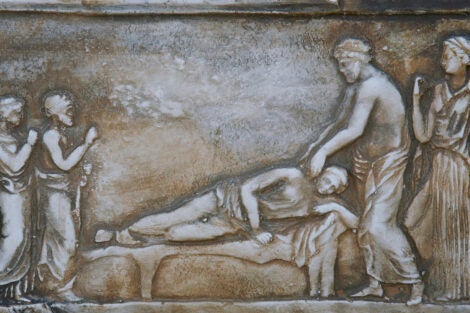January 11, 2024 – A potentially fatal virus is circulating, and there’s a vaccine that can help save people’s lives. But many people don’t want it.
That’s what has happened during the COVID pandemic. But it’s not a new phenomenon. The same thing happened in the late 1800s, when many people resisted taking the smallpox vaccine.
The history of vaccine hesitancy is one of several longstanding issues in public health highlighted in a new course that was offered for the first time at Harvard T.H. Chan School of Public Health last fall. Titled Reimagining Public Health–Historical Dimensions of Emerging Issues, the course tackles topics such as how life expectancy has been measured and used, tensions in the relationship between the fields of public health and medicine, and evolving approaches to determining the causes of disease.
Past is prologue
“The problems we have in public health today didn’t come out of the blue,” said Emily Harrison, instructor in the Department of Epidemiology and lead instructor for the course. “They evolved from choices made by individuals and organizations, shaped by historical contexts. So to understand the problems that we’re trying to address in public health, it can be very helpful to have an understanding of what has shaped those problems across time.” She added, “Having historical perspective can provide us with humility about solving these problems.”
Harrison’s co-instructors for the course included Allan Brandt, professor of the history of science in Harvard’s Faculty of Arts and Sciences and professor of global health and social medicine at Harvard Medical School; Jesse Bump, lecturer on global health policy in Harvard Chan School’s Department of Global Health and Population; Evelynn Hammonds, professor of the history of science and of African and African American Studies in the Faculty of Arts and Sciences, and professor in Harvard Chan School’s Department of Social and Behavioral Sciences, and David Jones, professor of the culture of medicine in the Faculty of Arts and Sciences and at Harvard Medical School, and professor in Harvard Chan School’s Department of Epidemiology.
Jones noted that some of the most fundamental questions of epidemiology are historical by nature. “Why do patterns of disease change over time? For example, why was tuberculosis the dominant disease of the 19th century and heart disease of the 20th?” he asked. “Answering those questions yields profound insights into the nature of disease as well as the power and limits of public health and medical interventions.”
“Historical perspective can also help us to manage some of the vexing problems of the present,” he said. “Many people were really frustrated that the COVID control programs—such as vaccines, masks, social distancing, school closures—became politicized. It is important for everyone to realize that this kind of resistance isn’t new. Anti-vax sentiment is as old as vaccinations, and masks were also controversial in 1918 during the flu pandemic. It’s possible to study these historical precedents to gain perspective and understanding that is valuable to us today. Ideally that would lead to solutions, but some of these problems are really intractable.”
Key lessons
For Harrison, one of the course’s major takeaways is that it helps students understand how the field of public health developed. “The field was really framed around the physical and life sciences,” she explained. “But because of the particular priorities of institution builders of the early 20th century, the political, social, and cultural dimensions of public health were relatively under-supported.”
This framing of the field has persisted over time, she said. “The way that [public health] researchers are funded remains bound in this life sciences framework. Most faculty and schools of public health support themselves on federal grants, which are primarily available for life sciences research. There are much smaller grants for social and political approaches.”
Students who took the class mentioned several discussions that stood out to them.
Betsy Osborn, Asia projects director in Harvard Chan School’s Department of Global Health and Population, who will graduate this year with a master’s degree in global health, found it meaningful to learn about efforts by American sociologist and historian W. E. B. Du Bois to collect and analyze information about health outcomes for Black Americans. “He felt that the collection and availability of that information was one of the things holding back social justice,” said Osborn. “And yet his work was largely ignored. I was very moved thinking about the almost glacial pace of social change that we’ve had since then. I’m thankful that we’re in a better place now, but it’s a shame that we couldn’t have benefited from his work earlier.”
For Sarah Boese, a first-year biostatistics PhD student, a class discussion about who should be making crucial public health recommendations in a democracy—public health experts or politicians—was compelling. “Do we move away from democracy if we say that Congress can’t make those decisions?” she asked. Osborn agreed that the discussion raised challenging questions. “What’s the role of individuals, the state, the health market, in generating [public health] information and incentivizing choice? It’s not clear cut and never will be,” she said.
“For me, the course underscored the indispensability of historical inquiry in public health,” noted Hebatalla Mohamed, a master’s student in global health and population. “This course challenged us to scrutinize not only health measures but also the success of controversial strategies, the delicate balance of health expertise and democratic governance, and the critical role of the environment in medicine and public health.”
Said Harrison, “We’ve had a number of really rich discussions. In every single class we’ve never had enough time to finish.” At the students’ request, Harrison added an additional discussion hour each week. “It’s been terrific,” she said. “It was just wonderful to feel those conversations come alive.”
Image: iStock/imagestock
